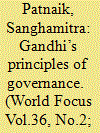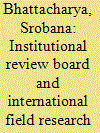|
|
|
Sort Order |
|
|
|
Items / Page
|
|
|
|
|
|
|
| Srl | Item |
| 1 |
ID:
136143


|
|
|
|
|
| Summary/Abstract |
The praxis of an Indigenous Fijian researcher who is both an insider/outsider offers some valuable lessons for ethnographic work. This paper introduces ‘cultural discernment’ as a concept used to ensure that the research process is culturally ethical within the research setting. An insider will always require a sense of cultural discernment, recognising that actions taken have implications that are critical and remain with the researcher for life. The paper contextualises the concept of cultural discernment in relation to Fijian epistemology. Although there are risks within any research project with regard to ethics processes and the conduct of research, this paper will illustrate how Western paradigms associated with ‘expert knowledge’ and the ‘lay knowledges’ of an Indigenous population group produce competing understandings about ethical practice. The paper draws on a doctoral research project exploring the cultural conceptualisation of health and well-being, conducted in Fiji and New Zealand. The research process and steps carried out in this study ensured those actions were culturally appropriate and ethically sound from an Indigenous Fijian perspective.
|
|
|
|
|
|
|
|
|
|
|
|
|
|
|
|
| 2 |
ID:
136880


|
|
|
|
|
| Summary/Abstract |
It is time to think about the rationales of space exploration, more than 50 years after the beginning of human space flight. Between J.F. Kennedy words (“landing a man on the Moon and returning him safely to Earth”) and the Mars One, what means today the dangers of exploration, or the concept of “representative of mankind” applied to the astronauts? Beyond the financial, technical and human risks, exploration, and today space exploration, belongs always to the human identity, the way to confront human nature (especially imagination) to the reality of time and space.
|
|
|
|
|
|
|
|
|
|
|
|
|
|
|
|
| 3 |
ID:
136841


|
|
|
|
|
| Summary/Abstract |
Ethics of Gandhian good governance stands the test of time for its universal character. Individual should think about the common interests and misery instead of concentrating on his own selfish interest. He makes the individual to discover truth by thinking of his neighbor, who represents humanity in miniature.
|
|
|
|
|
|
|
|
|
|
|
|
|
|
|
|
| 4 |
ID:
134803


|
|
|
|
|
| Summary/Abstract |
Research on political conflict can benefit immensely from fieldwork. However, the Institutional Review Board (IRB) process is elaborate and daunting that discourages rather than encourages this type of research. Existing policies often are insensitive to the many uncertainties related to field research abroad, especially in conflict zones. Three reasons for this are identified in this article. First, the federal regulations to protect human subjects of social science research are most suitable for biomedical sciences. Second, there is huge gap between “procedural ethics” and “ethics in practice.” Third, there is a lack of communication or dialogue between researchers and IRBs. After discussing these reasons, I offer the following suggestions: bridging the gap between the researcher and the IRB; reducing delays in the IRB approval and revision process; encouraging collaboration and dialogue among researchers; and advocating a proactive stance by academic associations.
|
|
|
|
|
|
|
|
|
|
|
|
|
|
|
|
| 5 |
ID:
134658


|
|
|
|
|
| Summary/Abstract |
Regrettably, moral arguments are largely absent from the current debate on nuclear disarmament. Indeed, complementing politico-strategic thinking with ethical categories could significantly strengthen the abolitionist call. To fill the gap, this article analyzes the evolution of the nuclear ethics of the Roman Catholic Church and especially its position on nuclear deterrence. If this strategy was granted interim and strictly conditioned moral acceptance during the Cold War, nuclear deterrence is today increasingly considered ineffective, an obstacle to genuine disarmament, and hence morally unjustifiable. In the new security context, the conditions for the Catholic Church's “interim nuclear ethics” have altered, and nuclear disarmament has become a feasible option and an alternative strategy to deterrence.
|
|
|
|
|
|
|
|
|
|
|
|
|
|
|
|
| 6 |
ID:
136884


|
|
|
|
|
| Summary/Abstract |
I argue that the moral justification for space science is more compelling than the moral justification for space development. Thus, we ought to reemphasize the status of science as a major stakeholder in space, especially when entertaining policies which might encourage the kinds of space development activities (e.g. resource exploitation) that are liable to conflict with the scientific uses of space.
|
|
|
|
|
|
|
|
|
|
|
|
|
|
|
|
| 7 |
ID:
136883


|
|
|
|
|
| Summary/Abstract |
I am sympathetic to the view that, given the likelihood of massive natural disasters, such as collisions between the Earth and large asteroids, we should engage in large-scale space exploration and colonization so as to hedge our bets against extinction. I will consider several criticisms of this view. For example, some philosophers may raise objections against the notion of long-term human survival as a value. How can we have obligations towards beings who have not even been conceived yet and thus cannot be properly said to have rights? On a different note, Wendell Berry argues that the abundance of resources in space will produce bad character, for good character requires the discipline of finitude. Others challenge the connection between space exploration and survival, for they fear that by entertaining the promise of new Earths in the heavens we are more likely to neglect our planet, thus leading to our downfall. Presumably, we should instead increase our efforts to restore and preserve the balance of nature. I will advance a variety of replies. For example, we do decide for posterity to a great extent. We may plant the trees from which “our” descendants will receive nourishment and shade, or we may destroy what could have given them a fighting chance against drought and famine. We have an obligation not to plant a bomb that will go off two years from now in a hospital nursery, and another to ensure that the buildup of chemicals in the hospital water tank will not reach critical mass and kill most of the newborns in ten years. The “balance of nature” involved in another objection is a myth that cannot be justified by natural history, whether astronomical or biological. Moreover, the inevitable changes in the environment, independent of asteroid impacts, will make the Earth uninhabitable in a few hundreds of millions and years. In addition, in order to act wisely we need an understanding of the Earth as a planet, and this requires the exploration of space.
|
|
|
|
|
|
|
|
|
|
|
|
|
|
|
|
|
|
|
|
|